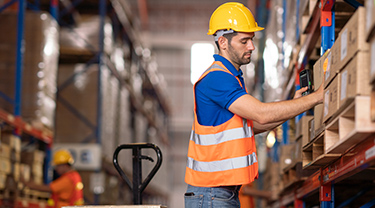
Ask the Export Help Team: Moving the goods
At Export Development Canada (EDC), we’re proud of our Export Help team. Every team member is an expert in their field, and every day, they help Canadian businesses navigate the challenges of global trade. They’re on the front lines to answer questions from exporting businesses and offer solutions to their struggles.
To further extend their reach, the team has started fielding questions from readers, like you, in every new issue of TradeInsights. This month’s roundup is all about tariffs, regulations and how to do your due diligence on international clients and partners. Read on.
Do you have a question for our team of advisors? Check out the Export Help Hub here.
Q: What trade regulations should I be aware of when exporting my products to India? I’ve already established an affiliate in the country.
– Alex from Moncton, NB
First things first: We strongly recommend that you work with a customs broker to clarify imports requirements. This isn’t an area where you want to take chances.
We’re happy to provide you with a few resources to help you along your exporting journey. In fact, we published an EDC guide called Doing Business in India that includes a complete overview of the general business environment in that country.
- Start by reviewing Chapter 6 on regulations on page 19. This section explains in detail that your Indian affiliate must be considered the importer and be legally able to bring goods into the country. To occupy the role of the importer, your affiliate has to comply with all Indian customs and import requirements.
You’ll want to use a customs broker, licensed by India’s Central Board of Indirect Taxes and Customs, to handle your affiliate’s imports. The Trade Commissioner Service will assist with identifying a customs broker in India.
- Our guide will also give you the lay of the land regarding India’s investment climate.
You’re also going to want to get a sense of India’s customs requirements more generally. Here are some resources to help you do that.
- The Central Board of Indirect Taxes and Customs publishes customs related information on their website, including:
- customs regulations,
- customs manuals,
- a customs duty calculator, and
- the latest tariff schedule that’ll show you which tariff rates may apply to your imports based on your product’s Harmonized System (HS) code.
- The Country Commercial Guides by the U.S. Department of Commerce are written for American companies, but most of their guidance is applicable to Canadian companies, like yours. Be sure to check out their guide on India.
- Use the left-hand side to navigate sections, like Import Requirements and Documentation, which will fill you in on the documentation requirement for importing into India.
I hope you’ll find these resources helpful, Alex. And remember, there’s no substitute for expertise: A customs broker can answer all of your trade compliance-related questions, but is also very likely to be able to prevent problems that you may never even have thought of.
Best of luck,

Amandine Gakima
Export Help Advisor
Export Development Canada
Q: How can I ensure that I’m dealing with a reputable company when selling overseas? Is there a correct process to conduct due diligence?
– Fatima from Whistler, BC
Whenever you’re dealing with new clients or partners abroad, due diligence is very important to minimize the export risks. You need to know that everyone you’re doing business with is who they say they are and can do what they say they’ll do.
Fortunately, there are standard commercial ways to verify those businesses before you sign an agreement. The following resources explain how you can conduct your due diligence.
- The Canadian Trade Commissioner Service (TCS) can do preliminary due diligence on your potential partners abroad. This is a great option since they’re already familiar with the market, no matter where your market is. They can also direct you to credit check bureaus or other private partners as needed.
- The TCS also offers tips on Due diligence in China, including best practices and a checklist for conducting due diligence. Although this page is written with the Chinese market in mind, its advice regarding due diligence is applicable to any market and well worth your time.
- We have a free tool that can help: EDC Company InSight. This database contains information about more than 100,000 international businesses. And it’s growing every day. If you can’t find the business you’re looking for, we’ll find it for you. Give it a try.
I hope this helps, Fatima. Due diligence can be time-consuming and complicated, but it’s critical to your company’s success in international business and will help you trade with peace of mind. Please write again if you run into any further challenges.
Best regards,

Emiliano Introcaso
Export Help Advisor
Export Development Canada


















